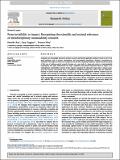| dc.contributor.author | Rau, Henrike | |
| dc.contributor.author | Goggins, Gary | |
| dc.contributor.author | Fahy, Frances | |
| dc.date.accessioned | 2018-05-03T08:31:34Z | |
| dc.date.issued | 2017-11-20 | |
| dc.identifier.citation | Rau, H., Goggins, G., & Fahy, F. (2018). From invisibility to impact: Recognising the scientific and societal relevance of interdisciplinary sustainability research. Research Policy, 47(1), 266-276. doi: https://doi.org/10.1016/j.respol.2017.11.005 | en_IE |
| dc.identifier.issn | 1873-7625 | |
| dc.identifier.uri | http://hdl.handle.net/10379/7324 | |
| dc.description.abstract | Academics are increasingly expected to produce concrete and directly applicable solutions to hard-to-solve 'real world problems' such as poverty, development, and environmental degradation. However, conventional assessments of the impact of science on society have not yet been adequately adapted to capture the diverse effects of this type of problem-centred research. Drawing on a case study of a large-scale project on (un)sustainable consumption, this paper demonstrates the range, complexity and potential long-term nature of impact in interdisciplinary sustainability research. It thus supports arguments for alternative approaches to impact assessment that question conventional views of translating scientific knowledge into action, value the multi-directionality of science-society relations and recognise diverse forms of engagement between scientists and non-scientific actors through non-academic channels and outputs. The paper also challenges common (mis)conceptions of work practices in a university context by demonstrating the highly innovative and inclusive nature of much sustainability research that seeks to address the needs of diverse communities of actors. It is argued that only radically different ways of conceptualising and measuring short-, medium- and long-term impacts can capture the success or otherwise of social-scientific and interdisciplinary sustainability research. | en_IE |
| dc.description.sponsorship | We wish to acknowledge the individuals who participated in this research, particularly CONSENSUS team members and others for their cooperation in completing the survey. This paper originates from the CONSENSUS project, funded by the Environmental Protection Agency of Ireland (Grant No: 2008-SD-LS-1-S | en_IE |
| dc.format | application/pdf | en_IE |
| dc.language.iso | en | en_IE |
| dc.publisher | Elsevier | en_IE |
| dc.relation.ispartof | Research Policy | en |
| dc.rights | Attribution-NonCommercial-NoDerivs 3.0 Ireland | |
| dc.rights.uri | https://creativecommons.org/licenses/by-nc-nd/3.0/ie/ | |
| dc.subject | Sustainability research | en_IE |
| dc.subject | Impact assessment | en_IE |
| dc.subject | Knowledge | en_IE |
| dc.subject | Science-society relations | en_IE |
| dc.subject | CONSUMPTION PRACTICES | en_IE |
| dc.subject | RESEARCH AGENDA | en_IE |
| dc.subject | KNOWLEDGE | en_IE |
| dc.subject | SCIENCE | en_IE |
| dc.subject | POLICY | en_IE |
| dc.subject | FOOD | en_IE |
| dc.subject | IMPLEMENTATION | en_IE |
| dc.subject | INFORMATION | en_IE |
| dc.subject | INNOVATIONS | en_IE |
| dc.subject | USABILITY | en_IE |
| dc.title | From invisibility to impact: Recognising the scientific and societal relevance of interdisciplinary sustainability research | en_IE |
| dc.type | Article | en_IE |
| dc.date.updated | 2018-05-02T12:45:10Z | |
| dc.identifier.doi | 10.1016/j.respol.2017.11.005 | |
| dc.local.publishedsource | https://doi.org/10.1016/j.respol.2017.11.005 | en_IE |
| dc.description.peer-reviewed | peer-reviewed | |
| dc.contributor.funder | Environmental Protection Agency | en_IE |
| dc.internal.rssid | 13900026 | |
| dc.local.contact | Gary Goggins, Energise Project Manager , School Of Geography And Archaeology , National University Of Ireland Galway. +353 87 123 2729 Email: gary.goggins@nuigalway.ie | |
| dc.local.copyrightchecked | Yes | |
| dc.local.version | ACCEPTED | |
| nui.item.downloads | 383 | |


